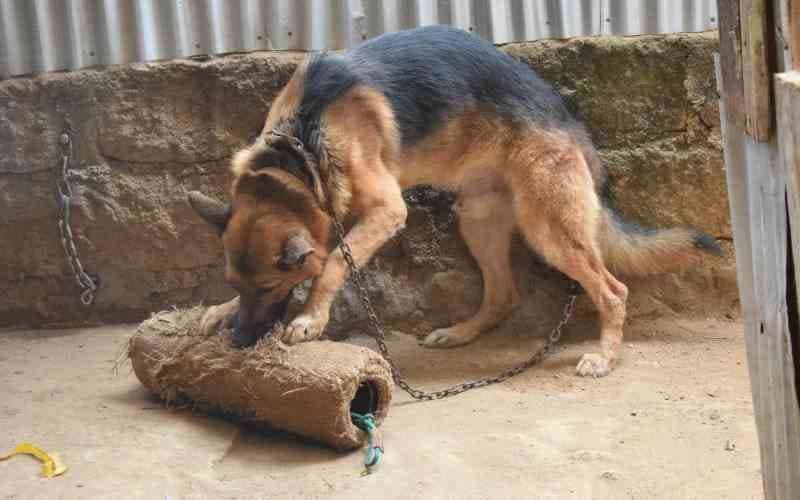We're loading the full news article for you. This includes the article content, images, author information, and related articles.
A recent viral video of a dog seemingly enjoying music has captivated audiences, drawing attention to the emotional lives of animals and reigniting discussions around animal welfare standards and policy enforcement in Kenya.

A heartwarming video of a dog enthusiastically reacting to its owner's music has garnered significant global attention, including in Kenya, where it has sparked conversations about the emotional intelligence of animals and the broader context of animal welfare. The video, which shows the dog, identified as Casper, a rising star with a voice that won't quit, interrupting his musician mom, Pam, during her songs or howling his own chorus, has been widely shared across social media platforms.
While the viral sensation highlights the endearing bond between humans and their pets, it also brings to the forefront critical issues concerning animal protection and the enforcement of existing laws within Kenya. The country has a robust legal framework for animal welfare, yet challenges persist in its practical application.
Kenya's commitment to animal welfare is enshrined in its 2010 Constitution, which mandates the state to protect both domestic and wild animals. This reflects the significant importance of animals for tourism, livelihoods, and cultural heritage in the country.
Key legislation includes the Prevention of Cruelty to Animals Act (Cap. 360) of 1962, revised in 2012, which prohibits acts of cruelty such as beating, torturing, overloading, or neglecting animals. The Animal Welfare Act, 2013, further aims to promote animal welfare, prevent cruelty, and ensure respectful and kind treatment of all animals, including domestic pets, livestock, and wildlife. Penalties for animal cruelty under the Animal Welfare Act, 2015, can include fines of up to KES 500,000 or imprisonment for up to five years, or both.
Despite these legal provisions, enforcement remains a challenge. The national government, through the Directorate of Veterinary Services (DVS), provides policy direction and technical guidelines on animal welfare. However, varying capacities and prioritization of animal welfare across counties can lead to inconsistent application of the laws.
There have been calls for the adoption of the Animal Welfare and Protection Bill 2019, which includes a definition of animal welfare aligned with international standards and recognizes all animals as sentient beings. This bill seeks to modernise the outdated Prevention from Cruelty Act (Cap 360).
Animal welfare organisations, professional associations, and academic institutions, often under the umbrella of Animal Welfare Action Kenya (AWAKE), play a crucial role in advocacy, public awareness campaigns, and supporting policy implementation. Their efforts include holding consultative forums with the government, conducting community outreach, and promoting responsible animal ownership.
Recent incidents, such as the rescue of dozens of dogs from inhumane conditions in Kitengela from illegal breeders and sellers, highlight the ongoing need for vigilance and stronger enforcement mechanisms. Additionally, a recent incident in October 2025 saw a Kenyan coach, Dennis Maragia, bitten by a stray dog in Delhi during the World Para Athletics Championships, underscoring concerns about stray animal management, even in international contexts.
The lack of consistent enforcement of animal welfare laws poses several risks, including continued animal suffering, potential public health concerns from neglected animals, and a negative impact on Kenya's image as a wildlife-friendly nation. The proliferation of viral content, while raising awareness, can also sometimes oversimplify complex issues, focusing on immediate emotional reactions rather than systemic problems.
While the viral video of the music-loving dog is generally perceived positively, the broader impact of such content on public debate and policy execution in Kenya remains an area requiring further analysis. Analysts suggest that viral media can influence near-term public debate and policy, with stakeholders urging clarity on timelines, costs, and safeguards related to animal welfare initiatives. The extent to which online virality translates into sustained advocacy and concrete policy changes in Kenya is still being understood.
The ongoing discussions surrounding animal welfare are likely to intensify, particularly with increased digital engagement from citizens. The progress of the Animal Welfare and Protection Bill 2019 through legislative processes will be a key indicator of Kenya's commitment to modernising its animal protection framework. Furthermore, the effectiveness of county-level initiatives in managing domestic animal populations and enforcing welfare standards will be crucial to watch.
Keep the conversation in one place—threads here stay linked to the story and in the forums.
Sign in to start a discussion
Start a conversation about this story and keep it linked here.
Other hot threads
E-sports and Gaming Community in Kenya
Active 9 months ago
The Role of Technology in Modern Agriculture (AgriTech)
Active 9 months ago
Popular Recreational Activities Across Counties
Active 9 months ago
Investing in Youth Sports Development Programs
Active 9 months ago